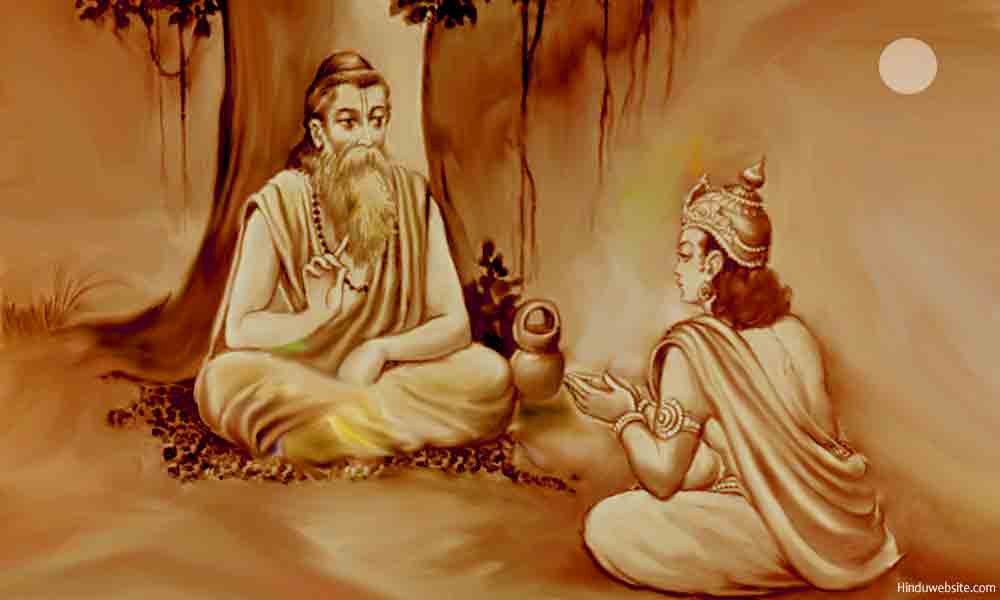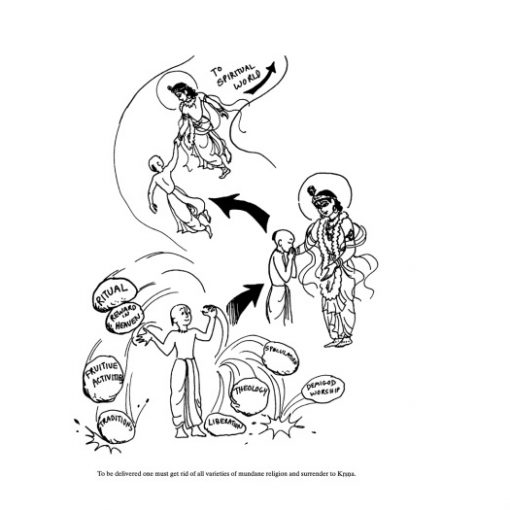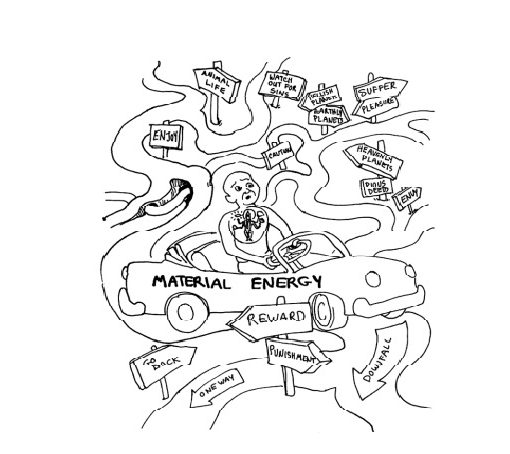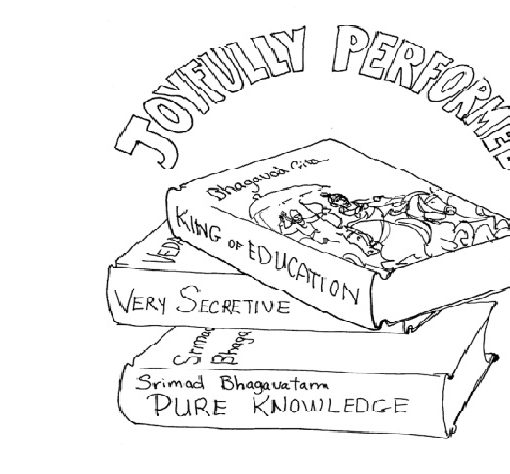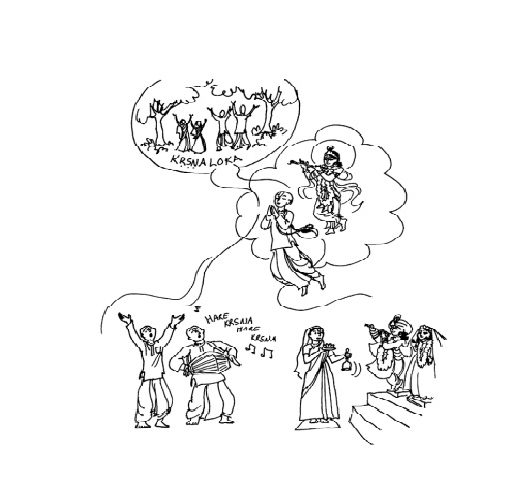The Glories of Chapter Six
Lord Visnu said, “Now I will tell you the glories of the Sixth Chapter of the Srimad Bhagavad-gita. Whoever hears this description, will be liberated from the material world.
On the bank of the Godavari river, there is a beautiful town of the name Pratishthanpur (Paithan), where I am famous by the name of Pippalesh. In that town there was a king of the name Janshruti, Whom the people loved very much and whose qualities were unlimited. He performed daily fire sacrifices, which were so opulent and large that the smoke from them reached the Heavenly pleasure garden known as Nandanvan, and made the leaves of the Kalpavrksa trees black. Those trees appeared as if they were offering their respects to king Janashruti. Due to the pious activities of that great king, demigods always resided in Pratishthanpur.
When Janshruti would give charity, he would distribute just as the clouds distribute the rain. Due to Janshruti’s pure religious activities, rain always comes at the right time. And the fields were always full of crops, which were not disturbed by the six types of rodents. He was always digging wells and lakes for the welfare of the citizens. The demigods, being very pleased with Janashruti, went to his palace in the form of swans to bless him. They were flying through the sky, one behind the other, talking together. Bhadrashva, along with two or three other swans, flew ahead of the rest. At that time, the other swans addressed Bhadrashva, “Oh, brother, why are you flying ahead? Do you not see in front of you the great king Janashruti, who is so powerful that he can burn up his enemies by his desire.” When Bhadrashva heard the words of the other swans, he started to laugh and said, “Oh brothers, is this king Janashruti as powerful as the great sage Raikva?”
When the king heard the words of the swans, he immediately came down from the roof of his high palace and happily sat on his throne. At that time he called his chariot driver and instructed him to go and find the great sage Raikva. When the chariot driver of the name Maha heard the king’s instructions, he became very happy, and left immediately to search out Raikva. First he traveled to Kashipuri, where Lord Vishvanath resides, for the welfare of all beings. Next, he went to Gaya, where the lotus-eyed Lord Gadadhara who is capable of freeing all beings from the bondage of birth and death, stays. After having traveled to many holy places, he came to Mathura, which is capable of destroying all sins. In this place the Supreme Personality of Godhead, Lord Krishna, resides. All of the great sages, demigods, also the Vedas, and other shastras, in their personal forms, perform austerities, and render service to Lord Krishna. Mathura which is in the shape of a half-moon, and is situated on the bank of the beautiful devotion-giving river Jamuna. In that area is the beautiful Govardhana hill, which adds to the splendor and glory of Mathura-Mandala like a large jewel in a crown. It is surrounded by pure trees and creepers. There are twelve wonderful forests surrounding Mathura in which Lord Krishna enjoys His wonderful pastimes.
After leaving Mathura, Maha traveled to the West, and then to the North. One day, he came to a town known as Kashmir in which he saw a very large and shining white place. At that place all of the people, even the foolish men, looked as beautiful demigods due to the fact that many sacrificial fires were burning continuously. It looked as if a row of clouds always hung over the town. The Deity of Lord Siva, known as Manikeshvara, resided in that town. The king of Kashmir had just returned from defeating many kings, and was engaged in worshipping Lord Siva. Due to his great devotion to Lord Siva, that king was known as Manikeshvar. Just close to the door of the temple, sitting on a small cart, underneath a tree, Maha saw the great sage Raikva. When he recognized Raikva from the description of Janashruti, he immediately fell at his feet and inquired from him. “Oh, great sage, where do you live? And what is your full name? You are such a highly elevated person. Why are you sitting in this place?” When Raikva heard the words of Maha, he thought for some time, and then replied, “I am fully satisfied, I do not require anything.”
When Maha heard this reply, in his heart he could understand everything. He immediately left on the long journey, back to Pratishthanpur. When he reached his destination, he immediately went and offered his respects to the king, and with folded hands informed the king of all the events, which had taken place. After the king had heard everything from Maha he decided to leave at once, to take the darshan of the great sage Raikva. Sitting in a beautiful chariot, and taking with him many valuable gifts, he left for Kashmir. When he reached the place, where the sage Raikva was staying, he fell at his feet and placed the entire valuable silks and jewels, which he had brought with him before Raikva. At that time, the great sage Raikva became very angry. He said, “Oh foolish king, you take all these useless things and put them in your chariot, and leave from this place”. The king immediately with great devotion, fell at the feet of Raikva, and begged his forgiveness, asking him to be merciful upon him. He inquired from Raikva, “Oh, sage, how have you attained such a high state of renunciation and devotion to the Lord?”
Becoming pleased with the king’s submissive attitude, Raikva replied “Daily I recite the Sixth Chapter of Srimad Bhagavad-gita ”. After that, king Janashruti heard from Raikva the Sixth Chapter of Srimad Bhagavad-gita. And thereafter, he engaged in daily reciting that Sixth Chapter. And in course of time a flower airplane arrived and took him to Vaikuntha. Meanwhile, that great sage, who was reciting the Sixth Chapter of Srimad Bhagavad-gita daily, went to Vaikuntha, where he engaged in the service of the lotus-feet of the Supreme Lord Visnu.
Anyone, who recites this Sixth Chapter of Srimad Bhagavad-gita, will very soon attain service to the lotus-feet of Lord Visnu, of this there is no doubt.
Source: Gita Mahatmya Folio Vedabase

